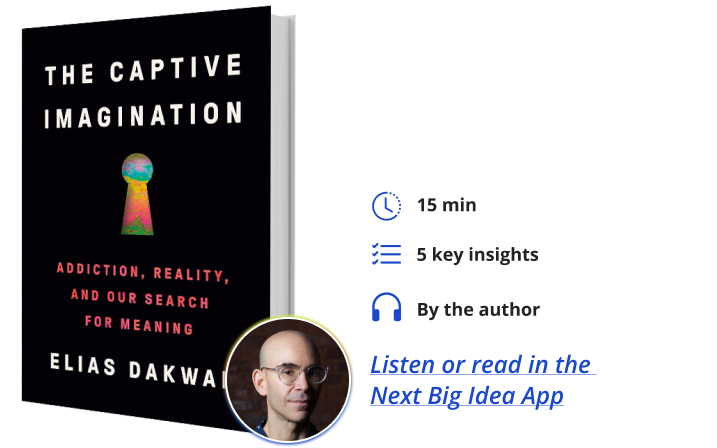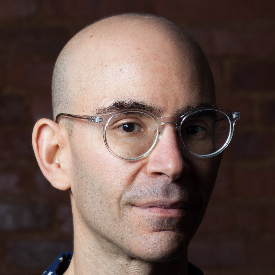Elias Dakwar is a researcher, psychiatrist, and addiction specialist based in New York City. He is an Associate Professor of Psychiatry at Columbia University.
Below, Elias shares five key insights from his new book, The Captive Imagination: Addiction, Reality, and Our Search for Meaning. Listen to the audio version—read by Elias himself—in the Next Big Idea App.

Myth 1: Drugs are the problem.
Drugs are as dangerous as fire—and also just as helpful when approached thoughtfully. Yet psychoactive substances are generally regarded with suspicion. One reason is that they are believed to have what scientists call abuse liability, a property inherent to the drug that compels misuse or addiction. Abuse liability is thought to result from drugs acting, to a greater or lesser degree, on certain brain circuits and modifying them over time, rendering the brain more vulnerable to problematic and compulsive use. Social policy to combat addiction has, therefore, focused on cutting off access to certain drugs, primarily through criminalizing them.
It is highly problematic to focus on the harm of drugs to the exclusion of a more balanced perspective. This is like regarding fire as possessing, say, “forest-fire liability,” and criminalizing it because it is inherently dangerous. There are also real-world consequences to this perspective, beginning with the direct harms that have resulted from the war on drugs, such as mass incarceration and black-market adulteration of substances.
The most flagrant issue, though, is that the data simply don’t support this myth. Most people who use drugs (and this goes for all drugs, including highly vilified substances such as heroin or methamphetamine) are able to maintain responsibility without going off the rails. In other words, only a fraction of people who use drugs develop addiction, which indicates that drugs are not the main issue. Further, some behaviors resemble addiction—such as problem gambling—that don’t involve drugs at all. If drugs aren’t the culprit, what is?
Myth 2. The brain is the problem.
It seems clear that certain people are more vulnerable to a diagnosable addiction than others, with this vulnerability likely underwritten by genetic, personality, environmental, and psychiatric factors. Even though drugs might not be the cause, it is believed that they can trigger a susceptible brain into developing an addiction, as might also be the case with certain activities such as gambling. Much is made of neuroimaging data to support this claim, such as data showing different patterns of activity in the brains of addicts versus those of non-addicts. This is taken to mean that addiction is the result of pathology in the brain.
The brain disease model has major problems. The biggest problem is that we are not merely our brains. Social, ecological, relational, cultural, and existential factors; our relationships to one another and the earth, our values, purpose, notions of well-being, the quality of our freedom and experience—these are given short shrift in the brain model if given any attention at all. Now consider the parallels between addiction and apparently normal, widespread human phenomena that have nothing to do with brain diseases, such as religious devotion, nationalism, ideological commitments, consumerism, militarism, and even scientific investigation, and creative achievement. All these phenomena speak to an important dimension of existence, which gets to the heart of both addiction and human suffering more generally: our attachment to imaginal and idealized worlds, be it a god, a state, a cause, a theory, an idea, or an intoxication. This attachment can often lead to devastating consequences, regardless of whether we are diagnosed with addiction.
“The biggest problem is that we are not merely our brains.”
Addiction, in other words, has an imaginal component—shared with so many other all-too-human endeavors—that needs to be considered for us to make progress in understanding and treating it.
Myth 3: Addiction is a disease.
As human beings, we have a deep need for meaning, a purposeful life, authenticity, and making sense of the world. This is a core part of our lives, whether we are addicts, artists, businessmen, or scientists. The most fruitful way to understand addiction is as an especially visible and anguished instance of this basic human striving.
This is why addiction can be so difficult to break. In short, it is deeply meaningful, providing a path through the world that is familiar, comprehensible, and anchored in experiences of value and purpose.
Despite its familiarity and meaningfulness, there is something unreal about this path too. The whole production can be at odds with reality or at least worsen the suffering it is intended to console. For example, a person may find in alcohol a kind of sanctuary, imagining intoxication as a solution to certain troubles. The person with addiction continues to regard it as a sanctuary even when it becomes, in reality, a prison.
Which brings us to another tendency. We are prone to mistake the unreal for the real. This confusion can be particularly thorny because reality is profoundly elusive, despite how eager we are to settle the matter. Many unrealities compete for our attention, with very little to guide our way and much to distract us. Addiction is a potent example of this yearning to exist meaningfully, and it is also an example of our confusion, inflamed to a critical point, with our unrealities no longer fitting seamlessly into our lives but tearing us apart. We cling to these unrealities, even when they begin to unravel, for a simple but profound reason: it is better than being left meaningless. We are held captive—whether as addicts, believers, or citizens—to a reality entirely made up though deeply meaningful, compelling, and destructive.
Myth 4: People with addiction lack freedom.
A fundamental question is why people with addiction continue making the same destructive decisions repeatedly. They seem to recognize the problem but end up in the same trap. The common understanding is that the person’s free will has been disrupted at the brain level. They can no longer exercise the freedom to make the right choices for themselves, to control themselves, and are steered instead to serve the drug to the detriment of everything else valuable in their lives. A common metaphor is that the brain has been hijacked by the drug.
“Some patients describe it as waking up from a dream.”
But the same imagination that exercised the freedom to find sanctuary in alcohol and to imagine the world accordingly might at any moment reimagine the entire world in a radically different way. Population-wide data support this, as does clinical experience. A pivot occurs, sometimes all at once and without treatment, toward a wholly different way of being, where the entanglements of the past no longer have us in their grip.
Some patients describe it as waking up from a dream. Maybe a more accurate way of putting it is that they move from one imagined world (one dream) to another. The old reality comes to be re-imagined and transformed into another more conducive to flourishing. The freedom to transform reality is what propels addiction, and it is what allows us to move beyond it. It remains present even in our darkest days. By better attending to this freedom and more skillfully mobilizing the imagination, we can better understand the roots of addiction and its treatment.
Myth 5: Addiction requires a medical solution.
What do Alcoholics Anonymous, religion, engagement with Indigenous rituals, therapeutic communities, yoga, meditation, drama therapy, narrative therapy, wilderness retreats, and creative practice have in common? They all involve a steady and persistent reimagining of oneself, one’s place in the world, and one’s relationships to foster greater attunement and authenticity—and they all might be helpful for addiction.
This is not to say that a medical approach is without value. As an addiction psychiatrist, I have been grateful for the tools at my disposal, which have been helpful for many people. But I also recognize that addiction is far more complex than a disease, dopamine loop, or bad habit in need of medicines or self-help books. There is a deeper process at play requiring our sensitivity and attention, and that touches on issues relevant to all of us, including our values, culture, ways of being, and our capacity for freedom and flourishing. I invite you to recognize in addiction a process that might be relevant to you, too, even if you have never touched a drug in your life. There is always opportunity to imagine ourselves and the world more truly.
To listen to the audio version read by author Elias Dakwar, download the Next Big Idea App today:
































